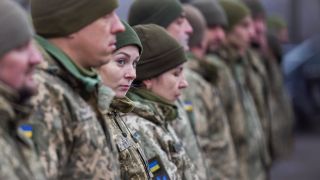Evolutionary Psychology
A Link Between War, Altruism, and Sex
How can apparent opposites of kindness and violence be interrelated with sex?
Posted January 24, 2024 Reviewed by Tyler Woods
Key points
- War, sex, and altruism are interrelated from an evolutionary psychology perspective.
- Sexual violence in war transcends history.
- Mathematical modeling explains how altruism favors men and women differently in war.

The tragic warfare in Gaza and Ukraine highlights what seems an inescapable dark aspect of human nature that paradoxically clashes with the human charitable capacity for altruism—selflessly giving aid to others. Yet these polar opposites are often displayed simultaneously, as we see by international relief organizations mobilizing to bring food, medicine, and military aid to combatants. Psychology can provide insight into these bewildering aspects of human behavior.
Evolutionary psychologists argue that altruism and sex differences in warfare are interrelated at a biological level. The premise for this conclusion, and for other evolutionary psychological analyses, is that a specific behavior is, in part, genetically determined, and it influences reproductive success; that is, the probability of passing on one’s genes to the next generation. Thus, the hub of evolutionary theory is mating choices.
The high-stakes consequences of mating choice set up a situation of competition between and within the sexes in a social group, but altruism reduces competition. How can the two be squared? War can promote altruism because individuals from the victorious group compete for mates with non-related females in the defeated groups.
Survival of the Fittest
Natural selection dictates how genes are inherited in an endless struggle for survival of the fittest. Warfare is a fight for survival. Thus, sex and warfare are linked when viewed from the perspective of evolutionary psychology.
Without altruism, there would still be fights, but no warfare. Warfare and altruism are intricately interrelated because, in war combatants put their own lives at risk for the good of others in their group. Individuals act selflessly in war to aid their nation in peril, to protect and assist their comrades in battle, and to sustain the well-being and survival of their families. From an evolutionary perspective, the human behavior of altruism provides an advantage because it promotes success in battle by uniting forces in the common goal of defeating an enemy. As a consequence, greater altruism in warfare will increase the reproductive success and inheritance of these qualities in subsequent generations because the winners will still be alive and not subjects of the other side.
Refuges and Migration in War
War also changes demographics by driving migration, often in a sex-specific manner. Thus, the dispersal of people during war is another important factor entwining sex and altruism. For example, as of March 2023, 7 million people (25 to 30 percent of the entire population) fled Ukraine after the Russian invasion, according to the European Union Commission. Through effects on demography, war can thereby reduce harmful competition between related groups of people in a society.
The relationship between war, sex, migration, and altruism raises several questions. Among these are: Which sex is favored by natural selection to be more altruistic in warfare? Which sex is favored to receive more altruism, which includes male-to-male, male-to-female, female-to-female, and female-to-male altruistic behavior? How can these questions be analyzed scientifically? Mathematics provides clear answers.
Calculating the Odds
The process of mathematical modeling in evolutionary psychology is somewhat like wargame scenarios carried out by the military using computers to predict the outcome of various battle scenarios mathematically. Instead of predicting how different factors in war change the probability of service members surviving, the probability that a specific gene influencing a specific behavior survives and is inherited by subsequent generations is calculated. Such modeling shows that warfare can promote within-group altruism, and the degree of altruism can depend crucially upon the sex of the giver and receiver of altruism.
There is not space here to consider all the questions raised above, but each one is analyzed in a study published in the journal Evolutionary Human Sciences. It turns out the modeling shows that both sexes are favored to be more altruistic towards women because the males tend to compete for reproductive opportunities against each other within their own societies. When a group is defeated in war, winning males compete with losers for females for mates. This keeps kin relatedness at a higher level while reducing competition for mates among kin. On the other hand, females in society are more likely to compete for mates against unrelated individuals in other groups.
Consider that if most men in a defeated group are excluded from competing for mates by the winning men, then both winning and defeated women compete for marriage in that group. In this case, war results in competition being more global for women than men. Men are then favored to be more altruistic than women because they have more to gain by reducing kin competition within their sex through altruism.
The modeling also shows that the sex that disperses less is favored to be more altruistic and to receive more altruism. Related individuals who are more likely to carry genes encoding altruistic behavior continue to be in close proximity with each other, generation after generation, and altruism spreads.
The Current and Future State of Warfare
Evolutionary psychology applies to time scales of several generations because it is based on natural selection and inheritance. Fundamental changes in gender roles and the technology of warfare in modern times alter some of the basic assumptions used in modeling. Swords and clubs are no longer state-of-the art weapons of warfare. The male attributes of greater size and physical strength are irrelevant to drone pilots, for example, and both sexes now engage in warfare.
Summing Up
Paradoxically, war, sex, and altruism are intimately related from a natural selection point of view based on survival of the fittest in passing on one’s genes to the next generation. This intermeshing of sex and violence in human nature has plagued humanity for eons, but all of this hinges on our species coalescing into groups. The fundamental human behavior to form cooperative groups, by definition, divides populations into "us vs. them" categories. This has tragic consequences related to racial, religious, and political violence, as well as warfare. At the same time, the extremely complex social behavior of human beings accounts for the success of such things as sales teams, winning the race to the moon, and dominating life on this planet.




